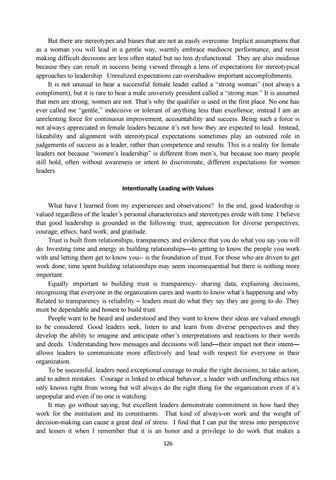But there are stereotypes and biases that are not as easily overcome. Implicit assumptions that as a woman you will lead in a gentle way, warmly embrace mediocre performance, and resist making difficult decisions are less often stated but no less dysfunctional. They are also insidious because they can result in success being viewed through a lens of expectations for stereotypical approaches to leadership. Unrealized expectations can overshadow important accomplishments. It is not unusual to hear a successful female leader called a “strong woman” (not always a compliment), but it is rare to hear a male university president called a “strong man.” It is assumed that men are strong; women are not. That’s why the qualifier is used in the first place. No one has ever called me “gentle,” indecisive or tolerant of anything less than excellence; instead I am an unrelenting force for continuous improvement, accountability and success. Being such a force is not always appreciated in female leaders because it’s not how they are expected to lead. Instead, likeability and alignment with stereotypical expectations sometimes play an outsized role in judgements of success as a leader, rather than competence and results. This is a reality for female leaders not because “women’s leadership” is different from men’s, but because too many people still hold, often without awareness or intent to discriminate, different expectations for women leaders. Intentionally Leading with Values What have I learned from my experiences and observations? In the end, good leadership is valued regardless of the leader’s personal characteristics and stereotypes erode with time. I believe that good leadership is grounded in the following: trust; appreciation for diverse perspectives; courage; ethics; hard work; and gratitude. Trust is built from relationships, transparency and evidence that you do what you say you will do. Investing time and energy in building relationships—to getting to know the people you work with and letting them get to know you-- is the foundation of trust. For those who are driven to get work done, time spent building relationships may seem inconsequential but there is nothing more important. Equally important to building trust is transparency- sharing data, explaining decisions, recognizing that everyone in the organization cares and wants to know what’s happening and why. Related to transparency is reliability – leaders must do what they say they are going to do. They must be dependable and honest to build trust. People want to be heard and understood and they want to know their ideas are valued enough to be considered. Good leaders seek, listen to and learn from diverse perspectives and they develop the ability to imagine and anticipate other’s interpretations and reactions to their words and deeds. Understanding how messages and decisions will land—their impact not their intent— allows leaders to communicate more effectively and lead with respect for everyone in their organization. To be successful, leaders need exceptional courage to make the right decisions, to take action, and to admit mistakes. Courage is linked to ethical behavior; a leader with unflinching ethics not only knows right from wrong but will always do the right thing for the organization even if it’s unpopular and even if no one is watching. It may go without saying, but excellent leaders demonstrate commitment in how hard they work for the institution and its constituents. That kind of always-on work and the weight of decision-making can cause a great deal of stress. I find that I can put the stress into perspective and lessen it when I remember that it is an honor and a privilege to do work that makes a 126
Issuu converts static files into: digital portfolios, online yearbooks, online catalogs, digital photo albums and more. Sign up and create your flipbook.
